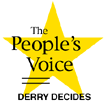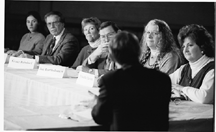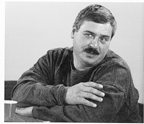Spring 1996
N.H.: “It’s Still the Economy”
By Donald Macgillis
Boston Globe
“People’s Voice” coordinator
 One day before he lost the New Hampshire primary, Sen. RobertDoleacknowledged not knowing about what was going on in that state: “I didn’trealize that jobs and trade and what makes America work would become a bigissue in the last few days of this campaign.”
One day before he lost the New Hampshire primary, Sen. RobertDoleacknowledged not knowing about what was going on in that state: “I didn’trealize that jobs and trade and what makes America work would become a bigissue in the last few days of this campaign.”
If Dole had been following the “People’s Voice” reports of the BostonGlobe, WBUR-FM and WABU-TV in New Hampshire, he would have known in thefallof 1995 that economic insecurity was a major concern for New Hampshireresidents.
“It’s still the economy,” was the lead of Michael Rezendes’ article in theGlobe Nov. 12 in which he reported on a poll about New Hampshireattitudesand on the first of a series of discussion groups the partnershipconductedwith citizens in Derry, N.H., a community picked as representative of thestate.
The view from Washington last fall was that the campaign would revolvearound which GOP candidate was best qualified to help House Speaker NewtGingrich carry through on promises of the Contract with America, includingthe securing of a balanced budget and a tax cut. But it quickly becameclearin the “People’s Voice” project that, despite New Hampshire’s apparentrecovery from the recession of six years ago (its unemployment rate is 3.2percent), residents of Derry were worried about losing jobs, losing wagelevels they had worked hard to attain, losing health insurance and losingthe hope that their children would find good jobs. All of these concerns,itwas evident, were interwoven with worries about the effects of long workhours on family life. 
Republican Presidential
candidate Lamar Alexander
speaks with members of the
“People’s Voice” panel at
Pinkerton Academy, Derry, N.H.
The two-fold goal of the project was to find and report on citizen viewsandthen challenge candidates to address them. After using in-depthinterviews,the poll and issues-discussion groups to get a fix on what citizens werethinking, the media partners brought GOP candidates together with Derrycitizens in single-candidate forums and a final “town meeting” event intheweek before the primary. Five of the candidates – Lamar Alexander, PhilGramm, Richard Lugar, Alan Keyes and Bob Dornan – met with Derry citizens.Dole, who did not, had to learn from Pat Buchanan what the primary wasabout, a lesson confirmed in exit polls on primary day showing that theeconomy and jobs were the issue that most determined how people voted.
The process of discovering and publicizing citizen views about the 1996election actually began in the summer of 1995. The “People’s Voice”partnersdecided to focus on one community, figuring it would be easier to tapintolocal concerns by becoming familiar with the problems and pressures ofcitizens who lived in one town.
After developing a network of contacts in the churches, schools, townoffices, workplaces and social-service agencies of Derry, projectcoordinators next conducted a series of in-depth interviews with citizenstofind out what was on their minds and what they thought the 1996 electionshould be about.
The interviews – conducted in the homes, shops and offices of Derryresidents – were traditional shoe-leather journalism. They were extremelyuseful in giving texture and context to residents’ views.

“My savings are gone.
I have no way of putting
my kids through college.
They’re going to grow
up to a global economy.
They have to be well
educated,” said Derry
resident Richard Desisto.
In addition, the interviews guided the journalists in the design of anattitude poll subsequently done by Princeton Survey Research Associates inDerry. The interviewing also helped identify residents willing to takepartin issues discussion groups and/or candidate forums. Participants for suchevents were also recruited from poll respondents: The poll’s lastquestionasked whether respondents would be willing to take part in such activitieswith partnership journalists.
The discussion groups on the status of the American dream, family values,the economy, the qualities voters seek in a candidate and campaignadvertising were all the subject of articles in the Globe and broadcastsegments on WBUR and WABU. In addition, print and broadcast reporters usedmaterial from the discussions as starting points for special, relatedfeatures, including one in the Globe exploring whether trade restrictionswould actually help the New Hampshire economy.

Jean Clary, owner of a
Derry real estate firm,
said “the mean-spititedness”
of the candidates “appeals to
the fear in people”
Once the interviews, poll and discussion groups had clarified what Derrythought the 1996 election should be about, candidates were invited to sitdown with residents of the town and answer their questions. Phil Gramm,Lamar Alexander and Richard Lugar each met individually with a group offiveor so at the Pinkerton Academy high school in Derry.
The Alexander forum provided a dramatic test of his campaign theme of”personal responsibility.” A questioner – a middle-aged woman with afull-time job, a family and an ailing aged relative – objected to thecandidate’s statement that Republican-proposed changes in Medicare andMedicaid could be dealt with if family members showed moreresponsibility.
This could, Alexander allowed, “be inconvenient and difficult.” But thequestioner, worried about the time demands on care-givers like herself,shotback, “Well, I think it’s more than inconvenient.”
Finally, on the Wednesday before the Feb. 20 primary, there was a townmeeting in a school auditorium in Derry. On a snowy night, more than 100residents showed up to watch five of their fellow citizens quiz Lugar,Dornan and Keyes in the live-telecast meeting. Members of the audiencealsoquestioned the candidates.
The event lasted just one hour, clearly nowhere near long enough for thepanelists, many members of the audience and candidate Lugar, who allstayedaround later to keep the discussion going. This was typical of “People’sVoice” events: Even when candidates had to take off to meet schedulingdeadlines, the citizens would remain to talk among themselves and with thejournalists while technicians dismantled the cameras, lighting and audioequipment.
Measured by the enthusiasm Derry residents brought to this project andbythe extra dimension it gave to the media partners’ primary coverage, itwasa success. In addition, material generated by the project served as abasisfor newspaper columns and editorials and broadcasting features even beyondthose done by the journalists directly involved. But Dole’s remark the daybefore the voting made it clear that “People’s Voice” efforts were lesssuccessful in getting the candidates themselves to listen closely to whatDerry was saying.
In the very first article of the Globe’s “People’s Voice” series, on Nov.10, Earl Rinker, the Derry town administrator and a Republican member ofthestate’s elected Governor’s Council, said, “I want to hear some positivethings about how we can create more jobs, improve the economy and dealwiththe country’s drug problem. I’m all for balancing the budget and cuttinggovernment. But that’s old news.”
With the exception of Buchanan, the candidates did not get the new news,and lost the primary.
Other “People’s Voice” coordinators were Tara Murphy for WBUR-FM andTed O’Brien, news director of WABU-TV.
